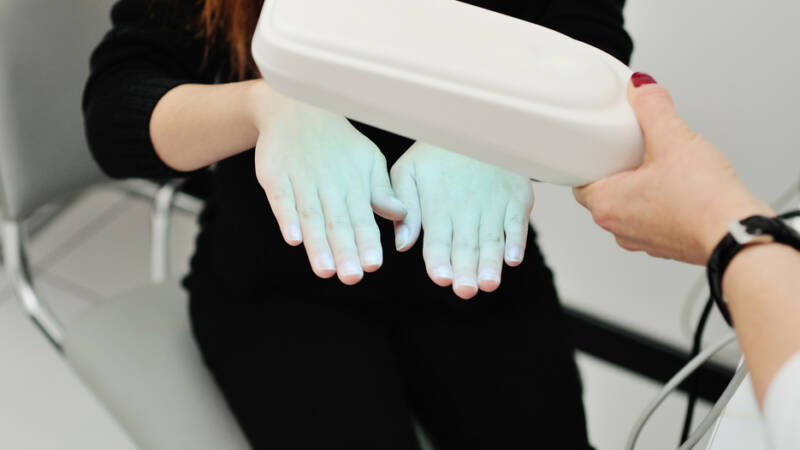Understanding Psoriasis: Triggers, Treatment and More

Psoriasis affects roughly 8 million Americans and 125 million people globally or about 3 percent of the population today. It’s an uncomfortable-at-best and painful-at-its-worst skin condition that negatively affects a person’s skin. Search online and read on to learn more about psoriasis.
Psoriasis is a disease that can affect anyone – men, women and children – at any age, but typically begins between the ages of 20 and 30. Another peek onset occurs between 50 and 60 years of age. There is no cure, but there is treatment that can help manage it. Here is what you need to know.
What Is Psoriasis?
Psoriasis is an autoimmune disease that causes the body to generate new skin cells every few days instead of the normal 27 days. There are many types, but over 80 percent of those with it have plaque psoriasis, which produces raised, thick, scaly patches (called plaques). They can appear anywhere but are most often found on the elbows, scalp, knees and lower back.
Other types of psoriasis include:
- Scalp Psoriasis – Patches of scaly skin on the scalp and hairline, which may lead to hair loss.
- Nail Psoriasis – Pitted, ridged, or thickened nails, which are often spotted with brown, white, or yellow pigmentation.
- Guttate Psoriasis – Small, scaly, red spots (called papules) that generally start in childhood. About 8% of people with psoriasis develop this type.
- Erythrodermic Psoriasis – Large patches of red, burnt-looking skin that can be life-threatening. About 2% of people with psoriasis develop this.
Once you develop psoriasis, it’s a lifelong condition. You can experience mild symptoms, flare-ups and times of remission, but you will always have psoriasis. Learning all you can about the condition and seeing a dermatologist can help to control symptoms and keep them from worsening.
Signs and Symptoms
The signs and symptoms of psoriasis can differ from case to case. They can vary from a few spots to painful plaques that cover large areas of a person’s body.
Common signs and symptoms include:
- Itchy, burning or sore skin
- Red patches of skin
- Patches of silvery scales
- Small scaly areas
- Dry, cracked skin that might itch or bleed
- Thickened, pitted or ridged nails
- Stiff and swollen joints
Some people only ever experience mild symptoms such as dandruff-like flaking on the scalp or a small red spot. Each case is unique and influenced by a variety of different factors, both those known and likely unknown. Psoriasis flare-ups can return frequently or infrequently, depending on the case, as well.
Triggers
Psoriasis has no known cause, which can be frustrating for sufferers, but genetics and environmental factors may play a role. If you have a parent with psoriasis, you are at a greater risk of developing it.
If you are predisposed to psoriasis, you may have no symptoms until an environmental factor triggers the immune response, such as:
- Cold, dry weather conditions
- Hormonal changes
- Strep throat, bronchitis, and tonsillitis
- Skin infections
- Skin injuries, such as a cut or scrape, sunburn, bug bite, tattoo or piercing
- Smoking
- Stress
- Excessive alcohol consumption
- Certain medications such as blood pressure medication, antimalarial drugs and lithium
- Rapid withdrawal of corticosteroids
- Certain foods, including gluten and nightshade vegetables
Talk to your doctor if you have psoriasis and want to discuss what might be triggering a flareup.
Treatment Options
Although psoriasis is not yet curable, treatment options can reduce symptoms and may even put it into remission for a period of time. Your doctor will choose a treatment regime based on the severity of your condition. The goal is to find the most effective treatment for you with the fewest side effects.
There are four common treatment modalities:
- Topical therapies come in various forms such as ointment, cream, lotion, gels, shampoos, foams and sprays. These therapies aim to reduce inflammation, scaling, redness and itchiness, and slow cell growth.
- Light therapy may be prescribed for moderate or severe psoriasis. There is some risk of temporary side effects such as red, itchy skin. Your doctor may prescribe something to treat any side effects.
- Oral or injected systemic medications may be used for moderate to severe psoriasis if other treatments are not working. Because of the higher risk of side effects, these treatments are used for short periods of time.
- Alternative therapies may help reduce milder symptoms. These therapies range from special diets, to creams, to herbs and supplements. Speak to your doctor before trying any alternative treatments.
Psoriasis is a problematic condition that can have a negative physical and emotional impact on a person’s everyday life. If you think you may have it, call your doctor. Educate yourself, take an active role and follow your doctor’s recommendations and treatment plan for the best results.